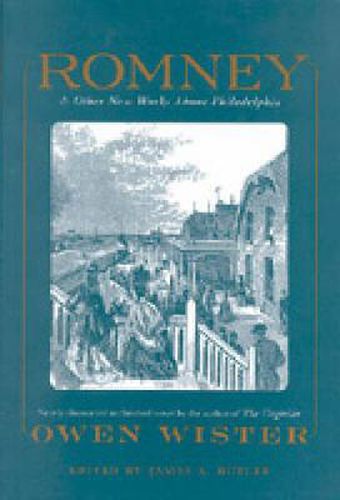Readings Newsletter
Become a Readings Member to make your shopping experience even easier.
Sign in or sign up for free!
You’re not far away from qualifying for FREE standard shipping within Australia
You’ve qualified for FREE standard shipping within Australia
The cart is loading…






Owen Wister is known to most Americans as the creator of the heroic cowboy in The Virgiman (1902). Despite his success as a Western novelist. Wister’s failure to write about his native city of Philadelphia has been lamented by many for the loss of a literary might-have-been. If only sighed Wister’s contemporary Elizabeth Robins Pennell in 1914, the novelist could understand that Philadelphia was a good a subject as the Wild West. Hence the surprise when James Butler uncovered a substantial fragment of a Philadelphia novel, which Wister intended to call Romney. Here, published for the first time, is the complete fragment of Romney together with two of his other unpublished Philadelphia works. Even in its incomplete state - nearly fifty thousand words - Romney is Wister’s longest piece of fiction after The Virgiman and Lady Baltimore. Writing at the express command of his friend Theodore Roosevelt, Wister set Romney in Philadelphia (called Monopolis in the novel) during the 1880s, when, as he saw it the city was passing from the old to a new order. The hero of the story, Romney, is a man of no social position who no netheless rises to the top because he has superior ability. It is thus a novel about the possibilities for meaningful social change in a democracy. Although, alas, the story breaks off before the birth of Romney, Wister gives us much to savor in the existing thirteen chapters. We are treated to delightful scenes at the Bryn Mawr train station, the Bellevue Hotel, and Independence Square, which yield brilliant insights into life on the Main Line, the power of the Pennsylvania Railroad, and the insidious effects of political corruption. Wister’s acute analysis in Romney of what differentiates Philadelphia and Boston upper classes is remarkably similar to, but anticipates by more than half a century the classic study by E. Digby Baltzell in Puriton Boston and Quoker Philadelphia (1979). Like Baltzell Wister analyzes the urban aristocracy of Boston and Philadelphia, finding in Boston a Puritan drive for achievement and civic service but in Philadelphia a Qualer preference for toleration and moderation, all too often leading to acquiescence and stagnation. Romney is undoubtedly the best fictional portraval of Gided Age Philadelphia brilliantly capturing Wister’s vision of old-money, aristocratic society gasping its last before the onrushing vulgarity of the nouveaux riches. It is a novel of manners that does for Philadelphia what Edith Wharton and John Marquand have done for New York and Boston.
$9.00 standard shipping within Australia
FREE standard shipping within Australia for orders over $100.00
Express & International shipping calculated at checkout
Owen Wister is known to most Americans as the creator of the heroic cowboy in The Virgiman (1902). Despite his success as a Western novelist. Wister’s failure to write about his native city of Philadelphia has been lamented by many for the loss of a literary might-have-been. If only sighed Wister’s contemporary Elizabeth Robins Pennell in 1914, the novelist could understand that Philadelphia was a good a subject as the Wild West. Hence the surprise when James Butler uncovered a substantial fragment of a Philadelphia novel, which Wister intended to call Romney. Here, published for the first time, is the complete fragment of Romney together with two of his other unpublished Philadelphia works. Even in its incomplete state - nearly fifty thousand words - Romney is Wister’s longest piece of fiction after The Virgiman and Lady Baltimore. Writing at the express command of his friend Theodore Roosevelt, Wister set Romney in Philadelphia (called Monopolis in the novel) during the 1880s, when, as he saw it the city was passing from the old to a new order. The hero of the story, Romney, is a man of no social position who no netheless rises to the top because he has superior ability. It is thus a novel about the possibilities for meaningful social change in a democracy. Although, alas, the story breaks off before the birth of Romney, Wister gives us much to savor in the existing thirteen chapters. We are treated to delightful scenes at the Bryn Mawr train station, the Bellevue Hotel, and Independence Square, which yield brilliant insights into life on the Main Line, the power of the Pennsylvania Railroad, and the insidious effects of political corruption. Wister’s acute analysis in Romney of what differentiates Philadelphia and Boston upper classes is remarkably similar to, but anticipates by more than half a century the classic study by E. Digby Baltzell in Puriton Boston and Quoker Philadelphia (1979). Like Baltzell Wister analyzes the urban aristocracy of Boston and Philadelphia, finding in Boston a Puritan drive for achievement and civic service but in Philadelphia a Qualer preference for toleration and moderation, all too often leading to acquiescence and stagnation. Romney is undoubtedly the best fictional portraval of Gided Age Philadelphia brilliantly capturing Wister’s vision of old-money, aristocratic society gasping its last before the onrushing vulgarity of the nouveaux riches. It is a novel of manners that does for Philadelphia what Edith Wharton and John Marquand have done for New York and Boston.